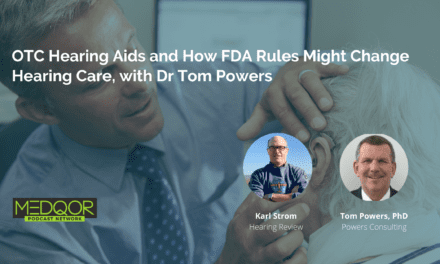Fennec Pharmaceuticals Inc. (NASDAQ: FENC; TSX: FRX), a specialty pharmaceutical company, announced that the US Food and Drug Administration (FDA) has approved Fennec Pedmark (sodium thiosulfate injection) to reduce the risk of ototoxicity associated with cisplatin in pediatric patients one month of age and older with localized, non-metastatic solid tumors. This approval reportedly makes Pedmark “the first and only treatment approved by the FDA in this area of significant unmet medical need.”
“The FDA approval of Pedmark represents an important breakthrough for pediatric patients with localized, non-metastatic solid tumors at risk for cisplatin-induced hearing loss. Cisplatin is a critical, standard of care agent, used in the treatment of pediatric cancers; however, even though effective, it could be harmful to children, frequently causing permanent and irreversible bilateral hearing loss. With Pedmark, physicians now have an approved treatment option to reduce the risk of cisplatin-induced hearing loss in pediatric patients,” said Rosty Raykov, CEO of Fennec Pharmaceuticals. “We would like to thank the patients, their families, physicians, investigators, employees, consultants, and the entire research team at Oregon Health and Science University, who have contributed to the development of Pedmark.”

The FDA approval of Fennec Pedmark was based upon safety and efficacy data from two pivotal open-label, randomized Phase 3 trials (SIOPEL 6 and COG ACCL0431), which compared Pedmark plus cisplatin-based regimen to cisplatin-based regimens alone for the reduction of cisplatin-induced hearing loss in pediatric patients. In both studies, the incidence of hearing loss was consistently and significantly lower in the Pedmark plus cisplatin arm compared with the cisplatin alone arm [21.4% vs. 73.3% (p = 0.005) and 32.7% vs. 63% (p = 0.002) with hearing loss in COG ACCLO431 and SIOPEL6, respectively]. The most common adverse reactions (≥ 25% with difference between arms of >5% compared to cisplatin alone) in SIOPEL6 are vomiting, infection, nausea, decreased hemoglobin, and hypernatremia. The most common adverse reaction (≥25% with difference between arms of >5% compared to cisplatin alone) in COG ACCL0431 is hypokalemia.
“Historically, there have been no approved treatments for preventing cisplatin-induced hearing loss. As a physician focused in pediatric cancer for many years, and a primary investigator in the pivotal Pedmark Phase 3 Clinical Oncology Group(COG) trial, the FDA approval of Pedmark addresses an enormous unmet need and for many children and young adults, has the potential to greatly improve everyday activities for these patients,” said David R. Freyer, DO, MS, Primary Investigator, COG ACCL0431, and Director of the Survivorship & Supportive Care Program, Cancer and Blood Disease Institute, Children’s Hospital Los Angeles.
Advances in chemotherapy-based treatment approaches for pediatric patients with localized, solid tumors have improved, resulting in an 85% or higher five-year survival rate for these patients2. However, use of platinum-based chemotherapy, still the treatment of choice in many cases, can be toxic to the ears and cisplatin treatment frequently causes permanent and irreversible bilateral (affecting both ears) hearing loss. Permanent hearing loss can be seen in approximately 60% of children treated with cisplatin and can be as high as 90%.1,2 Until now, interventions with management strategies such as cochlear implants and hearing aids only occurred after hearing loss had been detected and these interventions do not return normal hearing.3
“Hearing loss can have a profound impact on a person’s life, especially in children who are critically dependent upon normal hearing for cognitive, psychosocial, and speech development,” said Penelope “Peppy” R. Brock, MD, PhD, of Great Ormond Street Hospital in London and International Chair of the SIOPEL 6 trial. “Incorporating Pedmark into current treatment strategies with the goal to preserve hearing in children and young adults without reducing the effectiveness of their cisplatin treatment – is a welcome step towards helping to improve long-term outcomes for these patients.”
For more information about product availability and patient support, please contact the Fennec HEARS program at 1-833-7PEDMARK (1-833-773-3627).
The FDA granted this application Priority Review designation. Pedmark also received Orphan Drug designation by the FDA in 2004.
The Marketing Authorization Application (MAA) for sodium thiosulfate (tradename PEDMARQSI) is currently under evaluation by the European Medicines Agency (EMA).
- Langer T, Zehnhoff-Dinnesen AA, Radtke S, Meitert J, Zolk O. Understanding platinum-induced ototoxicity. Trends in Pharmacological Sciences. 2013;34(8):P458-P469.
- American Cancer Society website. Key Statistics for Childhood Cancers. https://www.cancer.org/cancer/cancer-in-children/key-statistics.html. Last Revised: January 12, 2022.
- Paken J, Govender CD, Pillay M, Sewram V. Cisplatin-associated ototoxicity: A review for the health professional. Journal of Toxicology. 2016;1809394.
- Rybak LP. Mechanisms of cisplatin ototoxicity and progress in otoprotection. Current Opinion in Otolaryngology & Head and Neck Surgery. 2007;15(5):364-369.
- Landier W. Ototoxicity and cancer therapy. Cancer. 2016;122(11):1647-1658.
- Bass JK, Knight KR, Yock TI, Chang KW, Cipkala D, Grewal SS. Evaluation and management of hearing loss in survivors of childhood and adolescent cancers: A report from the Children’s Oncology Group. Pediatric Blood & Cancer. 2016;63(7):1152-1162.
- Pedmark Prescribing Information. 11 Description.
Source: Fennec





